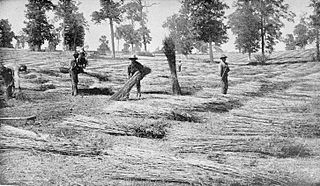
Hemp, or industrial hemp, is a botanical class of Cannabis sativa cultivars grown specifically for industrial or medicinal use. It can be used to make a wide range of products. Along with bamboo, hemp is among the fastest growing plants on Earth. It was also one of the first plants to be spun into usable fiber 50,000 years ago. It can be refined into a variety of commercial items, including paper, rope, textiles, clothing, biodegradable plastics, paint, insulation, biofuel, food, and animal feed.

Cannabidiol (CBD) is a phytocannabinoid discovered in 1940. It is one of 113 identified cannabinoids in cannabis plants, along with tetrahydrocannabinol (THC), and accounts for up to 40% of the plant's extract. As of 2019, clinical research on CBD included studies related to anxiety, cognition, movement disorders, and pain, but there is insufficient high-quality evidence that cannabidiol is effective for these conditions. Nevertheless, CBD is a herbal dietary supplement promoted with unproven claims of particular therapeutic effects. The global market size for CBD was predicted to exceed US$47 billion by 2028.

In the United States, the removal of cannabis from Schedule I of the Controlled Substances Act is a proposed legal and administrative change in cannabis-related law at the federal level. It has been proposed repeatedly since 1972. The category is the most tightly restricted category reserved for drugs that have "no currently accepted medical use.”

THC acetate ester is the acetate ester of THC. It is a metabolic pro-drug, with its subjective effects being felt around 30 minutes after ingestion.

In the United States, increased restrictions and labeling of cannabis as a poison began in many states from 1906 onward, and outright prohibitions began in the 1920s. By the mid-1930s cannabis was regulated as a drug in every state, including 35 states that adopted the Uniform State Narcotic Drug Act. The first national regulation was the Marihuana Tax Act of 1937.

The use, sale, and possession of cannabis over 0.3% THC in the United States, despite laws in many states permitting it under various circumstances, is illegal under federal law. As a Schedule I drug under the federal Controlled Substances Act (CSA) of 1970, cannabis over 0.3% THC is considered to have "no accepted medical use" and have a high potential for abuse and physical or psychological dependence. Cannabis use is illegal for any reason, with the exception of FDA-approved research programs. However, individual states have enacted legislation permitting exemptions for various uses, including medical, industrial, and recreational use.
The Industrial Hemp Farming Act of 2009, introduced during the 111th United States Congress by House Republican Ron Paul of Texas) and House Democrat Barney Frank of Massachusetts) on April 2, 2009, sought to clarify the differences between marijuana and industrial hemp as well as repeal federal laws that prohibit cultivation of industrial, but only for research facilities of higher education from conducting research. Industrial hemp is the non-psychoactive, low-THC, oil-seed and fibers varieties of, predominantly, the cannabis sativa plant. Hemp is a sustainable resource that can be used to create thousands of different products including fuel, fabrics, paper, household products, and food and has been used for hundreds of centuries by civilizations around the world. If H.R.1866 passes American farmers will be permitted to compete in global hemp markets. On March 10, 2009, both Paul and Frank wrote a letter to their Congressional colleagues urging them to support the legislation. This bill was previously introduced in 2005 under the title of Industrial Hemp Farming Act of 2005.

In the United States, the use of cannabis for medical purposes is legal in 38 states, four out of five permanently inhabited U.S. territories, and the District of Columbia, as of March 2023. Ten other states have more restrictive laws limiting THC content, for the purpose of allowing access to products that are rich in cannabidiol (CBD), a non-psychoactive component of cannabis. There is significant variation in medical cannabis laws from state to state, including how it is produced and distributed, how it can be consumed, and what medical conditions it can be used for.

James Richardson Comer Jr. is an American politician from the Commonwealth of Kentucky who represents the commonwealth's 1st congressional district in the United States House of Representatives. As the chair of the Oversight Committee from 2023, Comer started investigations into President Joe Biden and his family.

Cannabis in Wisconsin is illegal for recreational use. Possession of any amount is punishable by up to 6 months in prison and a $1000 fine for a first offense. A second offense is punished as a felony with up to 3.5 years in prison and up to a $10,000 fine. At the local level, however, numerous municipalities and counties have decriminalized cannabis or lessened penalties for minor possession offenses. Medical use is legal only in the form of low-THC cannabis oil.

Cannabis in Iowa is illegal for recreational use if classified as marijuana but consumable hemp products including CBD products are legal for consumers to possess and registered retailers to sell. Possession of even small amounts of marijuana is a misdemeanor crime. The state has a medical program for patients with qualifying debilitating medical conditions that allows for the legal sale and possession of no more than 4.5g of THC per patient every 90-day period. Allowed modes of consumption are oral & topical forms including, but not limited to; tablets and tinctures, nebulizable inhalable forms, suppositories, and vaporization.

Kentucky was the greatest producer of hemp in the United States during the 19th and 20th centuries, when it was the source of three fourths of U.S. hemp fiber. Production started to decline after World War I due to the rise of tobacco as the cash crop in Kentucky and the foreign competition of hemp fibers and finished products. In 1970, federal policies virtually banned the production of industrial hemp during the War on Drugs saying all Cannabis sativa is a Schedule I controlled substance. Federal law under the Agricultural Act of 2014 allowed research back into hemp. Kentucky began production again with 33 acres in 2014. As of the 2016 harvest season, only two U.S. states other than Kentucky had over 100 acres (40 ha) in hemp production: Colorado and Tennessee. The first 500-acre commercial crop was planted in Harrison County in 2017, and research permits were issued for over 12,000 acres (4,900 ha) that year. The 2016 documentary Harvesting Liberty concerns the 21st century Kentucky hemp industry.

Hemp beer is a form of beer infused with elements of the cannabis plant. Hemp beer is not brewed from hemp directly, but hemp products such as seeds are a later flavoring addition.
Hemp in Washington State has emerged as an experimental crop in the 21st century.
Hemp Industries Association v. Drug Enforcement Administration, often shortened to HIA v. DEA, refers to two lawsuits concerning the legality of cannabis extracts and other products from the hemp plant that have very low or nonexistent natural THC levels, including CBD oil, in the United States. The first is from 2004 and the second is from 2018.

The 2018 farm bill or Agriculture Improvement Act of 2018 is an enacted United States farm bill that reauthorized $867 billion for many expenditures approved in the prior farm bill. The bill was passed by the Senate and House on December 11 and 12, 2018, respectively. On December 20, 2018, it was signed into law by President Donald Trump.

Hemp in the United States was a legal crop in the 18th and 19th centuries. Production was effectively banned in the mid-20th century, but it returned as a legal crop in the 21st century. By 2019, the United States had become the world's third largest producer of hemp, behind China and Canada.

Ecofibre Limited is an Australian listed biotechnology company that produces and sells hemp derived products to consumers and retailers in the United States and Australia. The company's products include cannabinoid (CBD) oil and nutraceuticals as well as hemp derived food and textiles.










